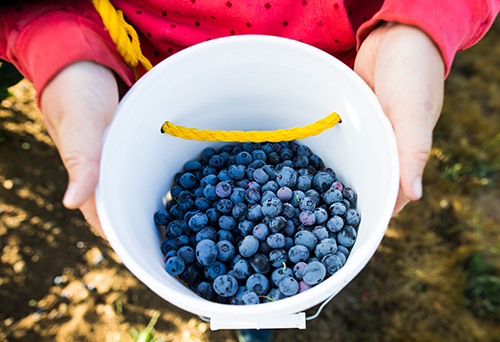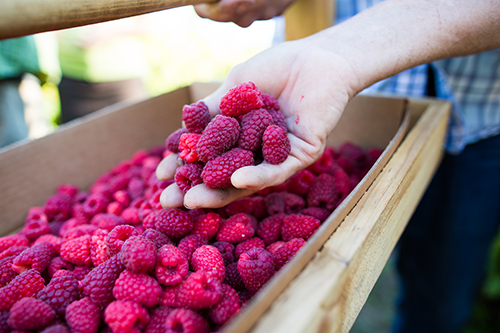Though inflation persists, PCC Community Markets has seen its impact on organic produce sales start to settle down of late.
“It is beginning to level out, but price perception is important for us on staple items,” said Elliott Lamoureux, produce merchandiser for the Puget Sound-area retail chain. “I am always focused on ensuring value on key items, including apples, broccoli, onions, and lemons. Additionally, we offer periodic ‘deals of the day’ on flash sales along with member-only offers for a percentage off in produce or a special freebie like a container of organic strawberries.”

Elliott Lamoureux, Produce Merchandiser, PCC Community Markets
A certified organic retailer and the largest community-owned food market in the US, PCC has prioritized organic produce for many years, and its produce department has been 95 percent organic (at minimum) since 2015.
“We choose organic to protect our farmworkers, bees, and waterways every way we can,” Lamoureux said. “Every beet, blueberry, and broccoli crown at PCC brings our values to life in colorful, edible, peak-season glory. Providing ethically and environmentally friendly local produce has always been our way because every community deserves the chance to eat produce that is organic, in-season, and at the peak of flavor.”
Lamoureux, who has worked for PCC since 2001 and was promoted to produce merchandiser last year, highlighted a number of recent trends he’s seen in organic produce in addition to inflation’s abating impact.
He said weather issues such as California’s atmospheric rivers have created a volatile organic market, driving up wholesale prices of strawberries and vegetables including lettuce, broccoli, and cauliflower. “PCC has mostly absorbed these increased costs,” he said.
“I am always focused on ensuring value on key items, including apples, broccoli, onions, and lemons." - Elliott Lamoureux
In terms of downward pricing trends, Lamoureux cited organic apples, noting that Washington State’s large crop has led the organic fruit to retail below conventional at times this season.
When it comes to popular organic items, Lamoureux said berries continue to be a mainstay for PCC, and he noted that recently grapes have been enjoying some special attention. “In the last year, grapes are getting more spotlight and consumer interest as the West Coast debuts lots of new varieties of grapes, such as Jupiter or Gummy Berry,” he said.

Another big trend at PCC is the shift to recyclable and compostable packaging, a move that is very important to PCC’s eco-conscious customer base.
“We are working to eliminate plastic as much as possible,” Lamoureux said. “Open-top compostable containers for berries, for example, are favored by our customers. Similarly, paper-handled bags that we package in-house are popular for both convenience and sustainability for apples and citrus or green beans and mushrooms during the holiday season.”
PCC’s fresh cut fruit program, known as the Chop Shop, has been a bright spot in terms of sales growth for the co-op in recent years. “It has yet to meet its ceiling,” Lamoureux said. “With a beautiful offering and convenience factor, our lunchtime crowd loves fresh cut fruit. PCC introduced house-made guacamole a little less than two years ago, and that is an ever-popular offering.” He noted that all fresh cut offerings come in compostable packaging.
Lamoureux said that year-over-year sales growth for the Chop Shop was 34 percent in 2023, and he expects to see a significant increase again this year.
“In the last year, grapes are getting more spotlight and consumer interest as the West Coast debuts lots of new varieties of grapes, such as Jupiter or Gummy Berry." - Elliott Lamoureux
When asked about some of PCC’s exciting offerings for later this spring and summer, Lamoureux highlighted local strawberries, blueberries, cherries, and stone fruit. “Our strawberries come from Rent’s Due Ranch in Stanwood, Washington—just north of Seattle,” he said. “We run our ‘Sweet Baby Blues’ campaign in July with blueberries from LaPierre Farms in Eastern Washington. Our Rainier cherries, peaches, and nectarines are also sourced from LaPierre.”
Sourcing locally is very important to PCC, and the co-op prioritizes produce that is both local and organic.
“At PCC, we like to say, ‘Eat like your neighbors grew it, because they did,’” Lamoureux said. “In our local growing season, about 25 percent of our produce comes directly from farms. During the rest of the year, we work most closely with Organically Grown Company.” Lamoureux noted that PCC also works with Peterson Fruit Company and Pacific Coast Fresh, two other distributors that, like Organically Grown Company, are based in the Pacific Northwest and source from many local growers.

Reflecting on his many years at PCC, Lamoureux summed up his favorite part of his job in one word: relationships. “My tenure at PCC is very influenced by the time I spent in our stores and is invaluable to the work I do today as a merchandiser,” he said. “I am lucky enough to have spent the last twenty years getting to know local farmers and working alongside the grower community to support their essential work.”
“What are the odds that the job I began as a teen would translate into an enduring co-op career?” Lamoureux continued. “PCC’s commitment to—and our shared passion for—social and environmental responsibility is infused into our work each day. I genuinely feel like I work in the service of nourishing this community while supporting vibrant, local food systems.”






